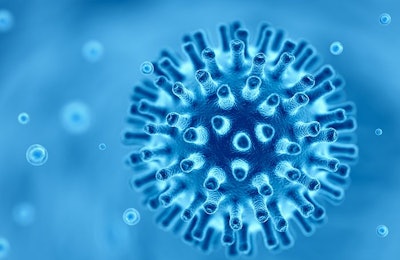
“Looking back, the 2015 highly pathogenic AI (Avian Influenza) experience in the U.S. probably prepared us for 2020,” said Travis Schaal, director of global production with Hy-Line International during the Business Insights Webinar, Profitable Egg Production, hosted by the International Egg Commission on December 3.
He went on to explain that the lessons learned then and continued improvements in biosecurity policies really helped to shape the year the poultry industry has faced with the COVID-19 pandemic.
In March, Hy-Line took some pretty drastic measures to make sure staff were protected despite the relatively low cases of COVID-19 within the state. However, the number of cases has changed significantly for the worse, with hospital intensive care units hitting maximum capacity in November. This leaves little to no room in the hospitals for other health related emergencies, explained Schaal.
“We are entering a pretty scary reality here of winter where cases are pretty much unmitigated in some of our midwestern states and we may be overwhelming our hospital resources to adapt to that. There is a lot to come in the days ahead but hopefully we can flatten the curve that’s been talked about since the beginning of this pandemic and take some of the pressure off of our medical workers,” he said.
In these unprecedented times, humans are now a vector of disease that can directly affect business, he explained. While the health of everyone remains critically important, essential jobs must be completed.
“We have a business to run supplying genetics to the globe and a food product and it is very stressful to balance both of those things, both our human safety and welfare of our families and friends as well as running a business that you all rely on,” he said.
Renew focus on worker health and safety
Egg farmers are part of an essential infrastructure that is responsible for feeding the world. With that in mind, worker health and personal hygiene is more important now than ever, as producers work to fill their obligation of feeding consumers.
Personal hygiene, hand sanitation, workplace sanitation and masks are a must to mitigate the spread of the virus, he explained.
“Use our experience from avian disease outbreaks for ... COVID,” said Schaal.
Restrict visitors, auditors, rodent technicians, or third-party crews, if possible. Also, limit staff interactions (crews, barn workers, office staff, plant staff) within a company.
“You cannot communicate enough,” he said. The how and why questions that are associated to company decisions related to the pandemic are important. Management should be consistent and match rules to scientific guidance so that there is something to fall back on for the actions a company may be taking, he explained.
Hy-Line has inserted plexiglass stations in its breakrooms to encourage social distancing during lunch time. Schaal believes that these will be a permanent part of business and believes that these are a wise long-term investment for reducing the spread of multiple illnesses.
Overwhelmed system
The biggest and first overwhelming thing as it relates to COVID-19 was the reduction of availability of diagnostic and protective equipment, including disinfectants, masks, gloves, paper products and testing supplies, like oral swabs.
Hy-Line even used its global resources to get masks from other countries in order to meet its needs for employees in a more economically friendly way.
Businesses in the United States are still overwhelmed with the what ifs associated with the virus. Schaal explained that the following questions remain a concern:
- Are staff offered paid sick leave?
- What if an immediate family member is exposed or sick?
- Contingency plans for reduced staff? i.e. Moving birds, vaccinating, daily barn work
“Even routine tasks can become very difficult when you’re short one person on the crew,” he said.
Mental health concerns due to the lockdown also need to be addressed as employees may be bringing personal stress with them to work. Schaal suggested using the term physical distancing rather than social distancing so that employees still feel like they can participate in some socializing with others without potentially spreading germs.
“This is a time for reflection and a time to really hone in on the things that will help our staff thrive, to follow the policies we need them to, in our work places every day,” he said.
Schaal commented that the industry is very lucky that COVID-19 is not a risk to birds.
View our continuing coverage of the coronavirus/COVID-19 pandemic.

















